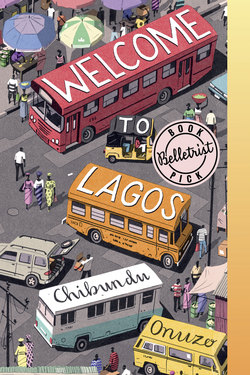Читать книгу Welcome to Lagos - Chibundu Onuzo - Страница 11
На сайте Литреса книга снята с продажи.
Оглавление4
CHIKE HAD GROWN ACCUSTOMED to the back of their hostage’s head, his thin neck, the pulpy scar behind his ear, the scattering of razor bumps on his otherwise smooth hairline, clipped within the last few days, in a militant camp no less. Perhaps, as well as a barber, the militants had cinemas and shopping malls.
The militants said they were fighting for compensation for the millions of gallons of crude that had gushed out of the ground since the 1950s, when a Shell-BP drill struck oil in “commercial quantities,” the magic phrase that would draw the French, the Dutch, the Chinese to this small corner of Nigeria, destroying the land and water from which the Niger Deltans gained their livelihood. The government called the militants criminals who spent their days hacking into pipelines and causing oil spills, kidnapping petroleum engineers, and smoking insensible amounts of weed.
If he were a civilian, Chike would have had sympathies, would have tried to puzzle out the rights and wrongs of each side, but his military training disposed him to neutrality. It was for politicians to decide who they fought and why, which causes were just and which were not. Soldiers dealt in orders alone, and it was because the colonel’s orders were illegal that he and Yẹmi were wandering through the bush now, following this young man who might or might not be leading them into an ambush. He was thirsty, almost deliriously so. The sun was now high in the sky and still no sign of the road.
“Halt,” Chike said. “In which direction is the road? North, south, east.”
“I don’t know. I just know how to get there.”
“We’ll kill you if you’re leading us into a trap. I swear it. Your water. Please.”
He had just noticed the plastic bottle tucked into the rebel’s belt.
“Please? When you’re pointing a gun in my face?”
Chike took four sips, letting the water sit in his mouth before swallowing. It was warm with a back taste of petrol. The oil seeped into everything in this place. His first urge was to spit it out. He passed the bottle to Yẹmi.
“Don’t finish it. Do you have anything to eat?” Chike asked their hostage. The boy put his hand to his pocket and Chike followed the movement with his gun.
“What the hell? You asked me for food and I’m getting it.”
The boy drew out a black polyethylene bag and then a newspaper-wrapped bundle from within it.
“Smoked fish. Maybe the last fish in the Niger Delta.”
Chike saw the longing in Yẹmi’s face.
“We’ll take a short break.”
They sat on the ground and the boy placed the fish between them. They all three stared at the white flesh, charred and blackened on the outside.
“You think it’s poisoned.” The boy smiled, showing even teeth. He took fish in his fingers and shoved it in his mouth. “More for me.”
The fish was dry but flavorsome. Beside him, Chike could hear the workings of Yẹmi’s jaw as he ate the flesh and then the slivers of silvery bone.
“So what are you two running away from?”
“Na who say we dey run?” Yẹmi asked.
“Soldier man wey lost for bush, no dey find fellow soldier. Dey look road. Looks like desertion to me.”
“We want a change,” Chike said. “What about you? You’re young to be a militant.”
“My juniors are back at camp. Don’t look at me as a small boy.”
“Explain something,” Chike said. “How will kidnapping oil workers bring roads to the Delta?”
“How will soldiers here bring peace? Money from our oil has built every infrastructure you see in Nigeria and yet we, the owner of the oil, don’t have hospital, schools, roads. When I was a child, you dip your hand in the water and you pluck out fish. Now everything is destroyed from oil spill. We didn’t start with violence but no one wants to hear the way of peace so the people have chosen war.”
They were borrowed words, the manifestos of others delivered with a conviction that would have been catching if Chike had been a journalist or a person passing briefly through the Delta. But he had seen the villagers harassed by militants and soldiers alike, just wanting to be left alone.
“The people have chosen?”
“Of course. We could not keep up the struggle without them. They feed us, their sons join us, they even send their women. You should see how many of these girls want our babies. Just yesterday, one came out of a tree and opened her legs.”
There was a loud rustling above them. It startled the soldiers to their feet and they took aim with their guns.
